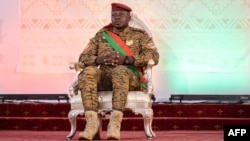Burkina Faso's junta leader Paul-Henri Sandaogo Damiba on Saturday urged junior officers to "come to their senses" after they said they ousted him in a reported coup that sparked deep concern among foreign leaders.
The officers on Friday said they had toppled Damiba, accusing him of failure to quell jihadist attacks. It is the second coup this year in the West African country, and the latest in the Sahel region, much of which is battling a growing Islamist insurgency.
Making his first comments since the putsch, Damiba in a written statement urged his rivals "to come to their senses to avoid a fratricidal war that Burkina Faso doesn't need.”
He rejected allegations by the army officers who seized power that he was hiding in a French base but provided no further details about his location.
Damiba himself came to power in a coup in January. He installed himself as leader of the country's 16 million people after accusing elected president Roch Marc Christian Kabore of failing to beat back jihadist fighters. But the insurgency has raged on.
Damiba "is believed to have taken refuge in the French base at Kamboinsin in order to plan a counter-offensive to stir up trouble in our defense and security forces," the junior officers said Saturday in a statement read out on national television and signed by Captain Ibrahim Traore, the country's new leader.
In his comments on the presidency's official Facebook page, Damiba called that claim an attempt "to manipulate opinion.”
France, the former colonial power in Burkina Faso, via its embassy earlier Saturday also denied "any involvement of the French army in the events of the last few hours.”
It denied "rumors that Burkinabe authorities have been hosted or are under the protection of the French military.”
The general staff of Burkina Faso's army dismissed the coup as an "internal crisis" within the military, and said dialogue was "ongoing" to remedy the situation.
'Burkina Faso needs peace'
Among a wave of international criticism, U.N. Secretary-General Antonio Guterres "strongly condemns any attempt to seize power by the force of arms and calls on all actors to refrain from violence and seek dialogue," his spokesperson said.
"Burkina Faso needs peace, stability and unity to fight terrorist groups and criminal networks operating in parts of the country," the U.N. statement added.
Jihadist violence has also prompted a series of coups in Mali, Guinea and Chad since 2020.
The new Burkina Faso putschists said they were willing "to go to other partners ready to help in the fight against terrorism."
No country was explicitly mentioned but Russia, whose influence is growing in French-speaking Africa, is among the possible partners in question.
France has a contingent of military special forces based in Kamboinsin which is about 30 kilometers from the capital, Ouagadougou.
A few hours before the coup Friday, hundreds of people had rallied in the capital seeking the departure of Damiba, the end of France's military presence in the Sahel and military cooperation with Russia.
Gunfire, helicopters
The situation in the capital was tense on Saturday, with gunfire and soldiers deployed in the streets.
Helicopters hovered above the city and shops shut their doors.
Late Saturday, a French government spokesperson strongly condemned "violence" against its embassy after an AFP reporter said he saw a fire outside the building in Ouagadougou.
Witnesses said there was also a fire in front of the French Institute in the western city of Bobo-Dioulasso.
African Union chief Moussa Faki Mahamat condemned the "unconstitutional change of government" in Burkina Faso.
The European Union warned the latest coup put in danger efforts towards restoring constitutional order by July 2024, while the U.S. government said it was "deeply concerned.”
Damiba accused of failure
Just before 8 p.m. (2000 GMT) on Friday, more than a dozen soldiers in fatigues appeared on the state television and radio broadcaster to announce Damiba's removal.
They proclaimed 34-year-old Captain Traore in charge. He was previously head of the anti-jihadist special forces unit "Cobra" in the northern region of Kaya.
"Damiba failed," said Habibata Rouamba, a trader and activist.
"Since he came to power, the zones that were peaceful were attacked. He took power but then he betrayed us."
The new leaders suspended the constitution, sealed the borders, dissolved the transitional government and legislative assembly, and instituted a 9 p.m.-5 a.m. curfew.
More than 40% of Burkina Faso remains outside government control.
In the north and east, towns have been blockaded by insurgents who have blown up bridges and attacked supply convoys.
Thousands have died and about 2 million have been displaced by the fighting since 2015, when the insurgency spread to Burkina Faso from Mali.




